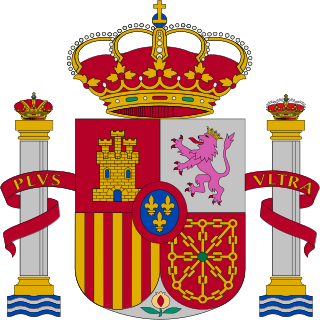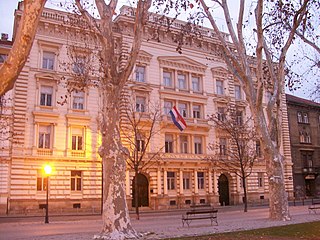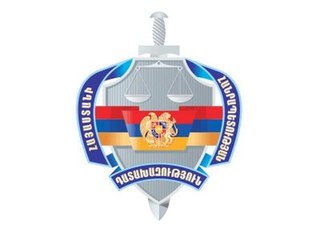Jurisdiction is the legal term for the legal authority granted to a legal entity to enact justice. In federations like the United States, the concept of jurisdiction applies at multiple levels.
The federal judiciary of the United States is one of the three branches of the federal government of the United States organized under the United States Constitution and laws of the federal government. The U.S. federal judiciary consists primarily of the U.S. Supreme Court, the U.S. Courts of Appeals, and the U.S. District Courts. It also includes a variety of other lesser federal tribunals.

The Supreme Constitutional Court is an independent judicial body in Egypt, located in the Cairo suburb of Maadi.

The law of Brazil is based on statutes and, partly and more recently, a mechanism called súmulas vinculantes. It derives mainly from the European civil law systems, particularly the Portuguese, the Napoleonic French and the German.

The judicial system of Egypt is an independent branch of the Egyptian government which includes both secular and religious courts.

In most legal jurisdictions, a supreme court, also known as a court of last resort, apex court, and highcourt of appeal, and court of final appeal, is the highest court within the hierarchy of courts. Broadly speaking, the decisions of a supreme court are binding on all other courts in a nation and are not subject to further review by any other court. Supreme courts typically function primarily as appellate courts, hearing appeals from decisions of lower trial courts, or from intermediate-level appellate courts. A supreme court can also, in certain circumstances, act as a court of original jurisdiction.

The Supreme Court is the highest court in the Kingdom of Spain. The court has original jurisdiction over cases against high-ranking officials of the Kingdom and over cases regarding the legalization of political parties. It also has ultimate appellate jurisdiction over all cases. The Court has the power of judicial review, except for the judicial revision on constitutional matters, reserved to the Constitutional Court.

The Constitution of Armenia was adopted by a nationwide Armenian referendum on July 5, 1995. This constitution established Armenia as a democratic, sovereign, social, and constitutional state. Yerevan is defined as the state's capital. Power is vested in its citizens, who exercise it directly through the election of government representatives. Decisions related to changes in constitutional status or to an alteration of borders are subject to a vote of the citizens of Armenia exercised in a referendum. There are 117 articles in the 1995 constitution. On November 27, 2005, a nationwide constitutional referendum was held and an amended constitution was adopted. The constitution was amended again in a national referendum on December 6, 2015 that changed the political structure from a semi-presidential system to a parliamentary republic.
The legal system of Azerbaijan is based on civil law. As the country was a republic of the Soviet Union until 1991, its legal history has also been influenced heavily by socialist law. However, after the collapse of the Soviet Union, Azerbaijan became independent by enactment of the constitutional act of national independence on 18 October 1991. Azerbaijan adopted a Constitution in 1995 which is the foundation of the legislative system of the modern country.

The judiciary of Colombia is a branch of the State of Colombia that interprets and applies the laws of Colombia, to ensure equal justice under law, and to provide a mechanism for dispute resolution. The judiciary comprises a hierarchical system of courts presided over by judges, magistrates and other adjudicators.

The Judiciary of Spain consists of Courts and Tribunals, composed of judges and magistrates (Justices), who have the power to administer justice in the name of the King of Spain.

Judicial review is a process under which a government's executive, legislative, or administrative actions are subject to review by the judiciary. In a judicial review, a court may invalidate laws, acts, or governmental actions that are incompatible with a higher authority. For example, an executive decision may be invalidated for being unlawful, or a statute may be invalidated for violating the terms of a constitution. Judicial review is one of the checks and balances in the separation of powers—the power of the judiciary to supervise the legislative and executive branches when the latter exceed their authority. The doctrine varies between jurisdictions, so the procedure and scope of judicial review may differ between and within countries.

The Supreme Court is the court of last resort in Serbia which reviews and possibly overturns previous rulings made by lower courts.

The Constitutional Court of Armenia is the highest legal body for constitutional review in Armenia. It is responsible for supervising the constitutionality of laws and other legislative instruments. The law of the constitutional court is defined in the Armenian constitution and by statute. The court, established in 1995, is located in Yerevan.

The judiciary of Croatia is a branch of the Government of Croatia that interprets and applies the laws of Croatia, to ensure equal justice under law, and to provide a mechanism for dispute resolution. The legal system of Croatia is a civil law system, historically influenced by Austrian, Hungarian and Yugoslav law, but during the accession of Croatia to the European Union, the legal system was almost completely harmonised with European Union law. The Constitution of Croatia provides for an independent judiciary, led by a Supreme Court and a Constitutional Court. The Ministry of Justice handles the administration of courts and judiciary, including paying salaries and constructing new courthouses. It also administers the prison system.

The superior courts of justice, or high courts of justice, are courts within the judicial system of Spain, whose territorial scope covers an autonomous community, as laid down in the Organic Law of Judicial Power.

The Supreme Court of the Dominican Republic is the highest court existing in the Republic and is, therefore, the head of the judiciary in the country.
The judiciary of the Philippines consists of the Supreme Court, which is established in the Constitution, and three levels of lower courts, which are established through law by the Congress of the Philippines. The Supreme Court has expansive powers, able to overrule political and administrative decisions, and with the ability to craft rules and law without precedent. It further determines the rules of procedure for lower courts, and its members sit on electoral tribunals.
The Judiciary of Azerbaijan exercises judicial power in Azerbaijan. Although the Azerbaijan constitution nominally guarantees judicial independence, the executive firmly controls prosecutors and judges. Judges and prosecutors collaborate in Azerbaijan to repress political opponents.

The Prosecutor General's Office of Armenia is a government agency tasked for supervising the public procurator system in Armenia, exercising its authority through the Prosecutor General of Armenia. It oversees the enforcement of Armenian law by law enforcement agencies such as the Police of Armenia and the National Security Service. The office is located on 5 Vazgen Sargsyan Street, Yerevan. The current Prosecutor General is Anna Vardapetyan.






















